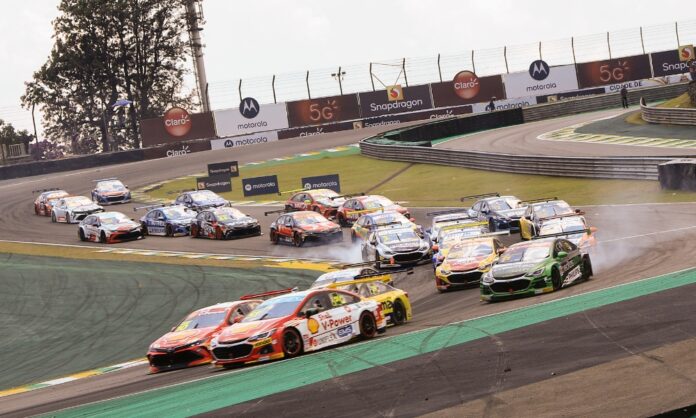Created in 1979, the Stock Car Pro Series is the main racing championship in South American motorsport. Throughout its history, local and international heroes such as Rubens Barrichello, Felipe Massa, Nelson Piquet Jr, and Ricardo Zonta have passed through its grids.
Throughout its history, the series has featured 11 car models from five different manufacturers. The first came from Chevrolet, a great supporter of the series since its inception, with the introduction of the Opala model in 1979.
As the championship evolved, so too did the cars – models like the Omega, Vectra, Astra and Sonic came to represent the Chevrolet brand. Currently, the Chevrolet Cruze and the Toyota Corolla are the models of choice in the Stock Car Pro Series.
In the past, Mitsubishi, Volkswagen and Peugeot have been part in the championship. This season, Chevrolet and Toyota are duelling for the title, and Mitsubishi will be returning to the series from 2025.
Behind the wheel
The Stock Car Pro Series has had many different champions over its 45-year history. The dominant force during that time has been Ingo Hoffmann, a Formula One driver who made just three starts at the Fittipaldi team in the 1970s. The Brazilian won an impressive 12 championships in the Stock Car Pro Series between 1980 and 2002.
Today, the driver currently active on the grid with the most championships is Cacá Bueno, who has won five titles. Other prominent names are two-time winner of the GT category at the 24 Hours of Le Mans Daniel Serra, who has won the championship three times, the same number as his teammate Ricardo Maurício.
Then there is Michael Schumacher’s former teammate Rubens Barrichello, a well-known figure in Formula One circles, who has two Stock Car titles.
Leading the next generation are Gabriel Casagrande, the reigning champion and holder of two titles, and Felipe Fraga, who became the youngest race winner in the series’ history at just 18 years old, while his title win in 2016 made him the youngest champion at 21.
A global broadcast footprint
With races broadcast to more than 150 countries in five languages, Stock Car is currently the main B2B and B2C relationship and experience hub for the entire South American sporting ecosystem.
This reach is made possible through an agreement with Motorsport.tv, but local coverage is also broad. In Brazil, races are broadcast by Band TV, which also shows Formula One. Other options for fans include subscription network SporTV and national TV channel Estadão. Plus, the series’ main events gather over 300 media professionals from all over the country.
In addition, Stock Car engages fans in the digital world, notably through collaborations with the famous iRacing community. The series also looks to regularly interact with fans through social media and has official channels on YouTube, Facebook, Twitch and TikTok.
Bringing together more than 200 national and international brands, the series is breaking records with its advertising return and brand exposure year after year. It also generates millions of dollars in economic impact for the cities in which its races are held.
Plus, the series was recently announced as an official event for the city of São Paulo, which has become an international hub for other motorsport events like Formula One, the World Endurance Championship (WEC), and Formula E.
International ambitions
While the Stock Car Pro Series has its origins in Brazil, it took its first step towards becoming an international series in 2023 with the Buenos Aires Grand Prix. In addition, the series added Montevideo in Uruguay to its 2024 schedule.
Stock Car has also been imaginative with its approach to venues, including when it held the first ever race at an international airport in full operation by staging the Galeão Airport Grand Prix. In 2024, the Belo Horizonte Grand Prix will be held around the Mineirão, a soccer stadium which hosted games during the 2014 World Cup.
Stock Car’s history is full of such initiatives. For instance, the Million Dollar Race was held 12 times in the past two decades. The Doubles Race also pairs household names from Stock Car with international stars, with the likes of Jacques Villeneuve, António Félix da Costa, Nicolas Prost, Vitantonio Liuzzi, Lucas Di Grassi, Jérôme D’Ambrosio, Nico Müller, Robin Frijns, Kelvin Van der Linde and Mark Winterbottom all competing in the series.
Bernie Ecclestone (centre), who has a connection to the series through his Brazilian wife Fabiana Flosi (left), pictured here with former Formula One driver and current Stock Car Pro Series competitor Felipe Massa
Environment first
As well as entertain, Stock Car has taken it upon itself to make a positive environmental and social impact.
Since the end of 2021, Stock Car has neutralised its events through carbon credits by capturing and directing these resources to NGOs focused on preserving areas in the Amazon region.
In April 2024, the series championed a national campaign involving Amazon tribes to alert the public to deforestation and draw attention to nearing the point of no return for the Amazon region as drought and fires escalate every year.
Also on the ESG front, the championship promotes campaigns to collect food supplies and clothing for local populations, as well as constantly promoting inclusion of people with special needs who have limited or no access at all to the sport.
The future
From next season, Stock Car will debut two evolutions to its cars. For the first time in its history, the series will adopt SUV bodywork, instead of the traditional sedan models, from Chevrolet, Toyota and Mitsubishi. A fourth brand is set to be announced at the end of 2024.
Under this new bodywork is an updated rollcage with a specially developed steel spec by AcelorMittal. The new technical package is designed to appeal to both interested parties and motorsport fans as it seeks to build on the already competitive action. Indeed, qualifying sessions regularly see one second splitting the first and last cars on the grid.
Source link : https://www.blackbookmotorsport.com/features/stock-car-pro-series-brazil-south-america-motorsport/
Author :
Publish date : 2024-07-23 16:40:58
Copyright for syndicated content belongs to the linked Source.





















































